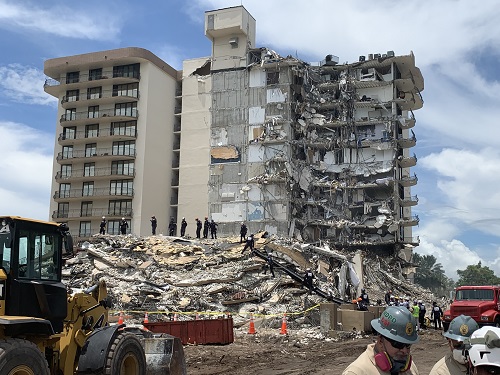
8.2.22 – SIW –Timothy J. Pastore, Esq.
A massive settlement in the Champlain Towers condo collapse put security technology training in the spotlight
From 1997 to 2001, I had the honor of serving as a Captain in the United States Air Force, where I learned many things, including the value of training. In the military, we were either accomplishing a mission or training for one. “Train like it’s real” was our guiding principle.
The military is not a for-profit organization; thus, it can devote time and resources to training. In contrast, most profit-driven businesses see training as mere expense instead of a profit-generator – which may be short-sighted, but too often, it prevails.
While companies in some industries can get away without proper training, security companies are not among them. A tragic example of this occurred in the case of the collapse of a 12-story residential building known as the Champlain Towers, located Miami’s Surfside condominium complex. The partial collapse occurred in the middle of the night on June 24, 2021, resulting in 98 deaths.
Inside the Champlain Towers Negligence Lawsuit
To no one’s surprise, a class action lawsuit was filed against dozens of defendants claiming money damages for negligence, wrongful death, and personal injury at Champlain Towers.
The lawsuit alleged that prior to the collapse, the building owner upgraded the existing fire system with many enhanced or new features, including a voice evacuation system, in the form of an intercom system in each condo unit that could transmit voice communications – mass notification – to all residents.
The plaintiffs claimed that the guard on duty during the night of the collapse – an employee of Securitas Security Services – heard unusual noises in the building and was concerned enough to call 911 emergency services. That call, which occurred about 10 minutes before the collapse, was prudent and appropriate. In addition, a manual fire alarm pull station in the lobby of the building was activated before the collapse; however, the guard allegedly had not been trained to use – and, indeed, did not use – the building’s voice notification system installed in each unit. Consequently, no voice communication was made to the residents advising them to evacuate.
As the lawsuit progressed to its discovery phase (where documents are exchanged and testimony is taken under oath), a Securitas manager allegedly acknowledged in a deposition that the company had not trained all its guards on how to use the voice alarm system, and that the system was not used on the night of the collapse.
While this does not mean that Securitas was responsible for the collapse, it did provide the class action plaintiffs with substantial leverage against Securitas for failure to mitigate loss of life and personal injury. I presume the plaintiffs also developed evidence against other defendants too.
Consequently, in July 2022 (approximately one year after the tragedy), a settlement of the class action lawsuit was announced that reportedly exceeded $1 billion, split between many defendants. Astoundingly, Securitas is reportedly contributing nearly half of the total settlement, amounting to $517 million. While I am not privy to the specific terms, I suspect that Securitas and the other settling defendants admitted no liability – a defense typically reserved even when paying money to settle a dispute.
Training Protects Your Business
What is most critical here – at least as to Securitas – is the confirmation that it failed to train its guards on the use of the voice notification system. While nobody can be sure that all lives would have been saved if that system was used, we can confidently conclude that the massive contribution made by Securitas to the settlement would have been far lower (or not made at all) if it had trained its guards on the use of the voice alarm system and they actually used the voice alarm system that night.
If your company is not conducting comprehensive and timely training, you too could find yourself on the wrong side of a lawsuit and potentially paying large sums of money. This will result in higher insurance premiums, decreased profits, lost time, and inconvenience.
The solution is at hand: Hire counsel, train your personnel, conduct table top exercises, protect yourself and the public, and always “train like it’s real.”
Timothy J. Pastore, Esq., is a Partner in the New York office of Montgomery McCracken Walker & Rhoads LLP (www.mmwr.com), where he is Vice-Chair of the Litigation Department. Before entering private practice, Mr. Pastore was an officer and Judge Advocate General (JAG) in the U.S. Air Force and a Special Assistant U.S. Attorney with the U.S. Department of Justice. Reach him at (212) 551-7707 or by e-mail at tpastore@mmwr.com.
